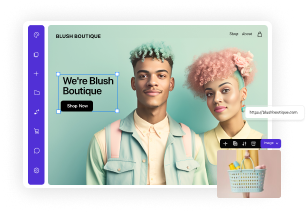25 Weird Business Ideas That Made Millions
Updated Dec 19, 2025 | Published Sep 23, 2025 | 12 min read

At first, many business ideas seem too strange or absurd to succeed, yet some go on to become roaring hits with their consumers.
Throughout history, many unconventional business ideas have evolved into multimillion-dollar ventures, demonstrating that thinking outside the box can yield extraordinary profits.
In this guide, we’ll explore 25 weird business ideas that broke the traditional mold, shattered expectations, and turned quirky ideas into household names.
Whether you’re an aspiring entrepreneur or seasoned business owner, finding a million-dollar idea that attracts customers is a common goal.
Thankfully, these real-life examples of weird business ideas should help inspire your creativity and showcase exactly how to break into niche markets.
So, without further ado, here’s our list of 25 weird business ideas that made millions:
The Idea: A mobile app that plays fart noises.
Total Sales: $400,000–$1 million
While smartphone apps are among the most common types of businesses today, novelty apps owe a debt of gratitude to the iFart app.
Released in 2008, when app store discovery was easier, the app revolutionized novelty applications with a library of fart sounds.
With its gimmicky properties and potential for pranks, the iFart app earned tens of thousands of dollars per day at its peak.
The Idea: Hotel made entirely from ice in Jukkasjärvi, Sweden
Total Sales: $1–2 million per season
Founded by Yngve Bergqvist, the Icehotel in Sweden offers an experience unlike any other hotel in the hospitality industry.
With its unique combination of hotel facilities and artistic, sculptured design, its unique selling point and unusual business model are clear.
Established in 1989, the hotel’s website demonstrates the importance of excellent branding, with a suitably snow-themed design.
The Idea: A vacuum cleaner adapter for cutting hair.
Total Sales: $2 million annual revenue
The concept of designing a vacuum cleaner attachment for cutting hair isn’t something investors would expect to succeed.
Flowbee proves that a successful business can be formed from outlandish ideas, selling millions of units since its release in 1988.
It’s also an excellent example of how late-night TV infomercials influenced pop culture, promoting quirky products to the masses.
Learn more: Top 10 types of advertising and how to use them.
The Idea: Novelty decorative car antennas.
Total Sales: $3–5 million
Another popular novelty item with low production costs that generated millions is the Antenna Ball, released in the 1960s.
Easily fitted to car antennas, they’re often used in promotions for other brands, such as fast food chains and sporting mascots.
If you’re coming up with a business name, Antenna Balls is an excellent example of how to combine uniqueness and nostalgia.
The Idea: Sunglasses made for dogs.
Total Sales: $3–5 million annually
Profitable businesses don’t require vast sums of investment to get started, as the Doggles dog sunglasses brand demonstrates.
Launched with just $25,000 in startup funds, it has since become a consistently high seller for dog lovers worldwide.
The product has evolved to meet changing consumer demands, offering models for sports, motorcycling, and even military dogs.
The Idea: Customized potatoes with personalized messages.
Total Sales: $5 million
The target audience for personalized messages is significant, but placing messages on potatoes isn’t an obvious design decision.
Dubbed the message service “you didn’t know you needed” by the mainstream media, Potato Parcel became an instant viral success.
This success was enhanced by celebrity social media shares and press coverage, which popularized the novelty concept.
The Idea: Personalized letters sent from Santa.
Total Sales: $5–10 million (seasonal business)
Most parents have experiences of discussing Santa Claus at Christmas and writing letters to ask for gifts.
The Santa Mail company takes matters out of parents’ hands, delivering dedicated letters from Father Christmas to millions of children.
Generating over a million dollars every Christmas, it’s an inspirational business idea for the holiday season.
The Idea: One website selling ad space by the pixel.
Total Sales: $1,037,100
Founded in 2005 as a one-off small business idea, The Million Dollar Homepage quickly exceeded revenue expectations.
It involved selling individual pixels as tiny image links, successfully blending novelty and scarcity in a single concept.
The Million Dollar Homepage represents the precursor to viral marketing and innovative startup thinking to this day.
The Idea: Mail-order human and animal skeletons.
Total Sales: $3–5 million
Most popular subscription models are built around self-care business ideas, from shaving gear to healthy eating.
Skulls Unlimited took a radically different approach, selling authentic and replica animal and human bones to international customers.
Its enduring appeal comes through its novelty and utility, providing educators with hands-on examples for students.
Related read: Top 10 subscription business models.
The Idea: Regular rocks sold as “pets.”
Total Sales: $6 million
Incongruity is a core characteristic of innovative concepts, which forge new ideas from seemingly incompatible elements.
Few products capture this spirit quite like The Pet Rock, with owners encouraged to treat their rock like a real pet.
It’s a funny and absurd concept that sold millions, thanks to eye-catching brand elements and pop culture appeal.
The Idea: Comical false teeth.
Total Sales: $50 million+
Founded in 1994 by entrepreneur Jonah White, the Billy-Bob Teeth novelty fake teeth have become a staple of joke shops.
Designed with a “hillbilly” aesthetic, they’re widely used in Halloween costumes, influencing the broader novelty product market.
It’s also an excellent example of how funny business names can boost awareness and help a business grow.
The Idea: Unconventional soda flavors.
Total Sales: $100 million+
Launching a product range of unusual flavors is a potential risk for any company, particularly for popular soda beverages.
Jonas Soda proved the concept could succeed, offering unconventional flavors that ranged from turkey and gravy to mashed potatoes.
The brand’s enduring appeal stems from its community-driven approach and appreciation for its counterculture target audience.
The Idea: Figurine with “living” green hair.
Total Sales: $100 million+
Chai Pet bears a resemblance to The Pet Rock, from its kitschy charm to its encouragement of owners to engage with the product.
These terracotta figurines grow “hair” in the form of sprouted chia seeds, which can then be cut and styled.
Chia Pet’s popularity has endured and has been included in a time capsule set to be opened in the year 3000.
The Idea: Novelty singing fish wall ornament.
Total Sales: $100 million+
The Big Mouth Billy Bass wall ornament is among the most popular and enduring novelty items of recent decades.
Reportedly loved by the Queen, it has sold millions of units since the 1990s, and has appeared in movies like WALL-E.
Original, unopened Big Mouth Billy Bass products have become collector’s items worth upwards of $200 each.
The Idea: High-end bunkers for the elites.
Total Sales: $100–200 million annually
Established in Switzerland, Oppidum’s luxury bunkers are a far cry from the mass appeal of many other weird business concepts.
Serving as a bunker design and consulting business, they build high-end bunkers for the world’s super-rich.
Equipped with swimming pools, cinemas, and even gardens, Oppidum’s L’Heritage bunkers cost in the range of $60 million.
The Idea: Trapping odors in toilets.
Total Sales: $400+ million
Bathroom fragrance products are commonplace, but Poo-Pouri applied an entrepreneurial mindset to offer something new.
Designed to trap odors in toilets, the company was valued at $240 million in 2019 and has continued to rake in profits since.
This success was partly due to its unconventional marketing, which combined amusing branding with vintage bottle designs.
The Idea: A blanket with sleeves.
Total Sales: $500 million+
Sometimes, the most unusual business idea is also the most simplistic, as the Snuggle fleece blanket with sleeves demonstrates.
Initially marketed through infomercials, Snuggle soon enjoyed cultural impact on social media and parody TV slots.
Today, it remains a popular seller in the wearable blanket market, which is now valued at over $1 billion annually.
The Idea: Online classifieds platform.
Total Sales: $1 billion+ annual revenue
With online classified advertising a common feature of the internet today, it’s easy to underestimate the importance of Craigslist.
The platform revolutionized online business ideas and laid the foundations for websites like eBay and Facebook Marketplace.
Craigslist continues to generate impressive annual revenue, covering everything from job listings to real estate and rentals.
Recommended read: 127+ small business name ideas
The Idea: Luxury pet hotels and spas.
Total Sales: $1.9–2.6 billion
Providing both short-term and long-term kennels makes perfect sense as a viable resource that most pet owners turn to.
Dogtopia identified an opportunity to reach new clients by enhancing the concept into a fully-fledged hotel and spa for pets.
It’s a quirky business idea that paid off, with Dogtopia’s annual revenue averaging over $900,000 across hundreds of locations.
The Idea: Handheld device to improve focus and concentration.
Total Sales: $3–5 billion+
Toys and stress relief products aren’t intuitive bedfellows, but Fidget Spinners proved to be a hugely successful business idea.
These simple devices have become firm favorites among individuals seeking to relieve stress and enhance concentration.
Indeed, the Fidget Spinners craze is credited with boosting the toy industry, making vast sums of money since 2017.
The Idea: Plush toys turned collectibles.
Total Sales: $6 billion (at peak craze)
Most people are familiar with Beanie Babies, the cute stuffed animals created in 1986 in a range of unique designs.
Their popularity in the first year of release was phenomenal, with sales on eBay alone reaching $500 million in 1997.
A fun toy appreciated by children and adults alike, Beanie Babies have become firmly embedded in nostalgic consumer culture.
The Idea: Portable virtual pet care.
Total Sales: $6.2 billion+ annual revenue
Launched in 1996 by Bandai, the Tamagotchi digital pet quickly became a global phenomenon in mainstream culture.
Over the decades, it’s sold over 100 million units, with renewed popularity following the opening of Bandai’s London store in 2024.
With countless simulation apps available today, it’s easy to overlook just how revolutionary the Tamagotchi concept was.
The idea: Embracing “ugly but comfortable” reputation.
Total sales: $28 billion+
Fashion companies typically focus on their unique sense of style when promoting their clothing and accessories.
Crocs decided to flip the script, using their reputation for “ugly” footwear as its central and unique selling point.
The gambit worked, with Crocs becoming a cultural phenomenon thanks to high-profile endorsements from pop stars like Justin Bieber.
Read this next: How to trademark a business name.
The Idea: The classic yellow smiley licensed worldwide.
Total Sales: $50 billion+ (lifetime merchandising)
The smiley face design first emerged during the peak of the 1960s counterculture movement as a symbol of happiness.
Today, the design is instantly recognizable, influencing fashion trends and popular music culture worldwide.
It’s a textbook example of how to transform a simple concept into a profitable and scalable business idea.
The Idea: Renting out air mattresses to travelers.
Total Sales: $100 billion+
Setting up your own business doesn’t have to require extensive investment, as Airbnb’s innovative business model demonstrates.
By drawing on space from homeowners and renters, the business offers a range of accommodations for holidaymakers worldwide.
Airbnb’s CEO attributes this success to the importance of adopting new platforms early, before the market becomes oversaturated.
Starting a business is never easy, which is why many entrepreneurs play it safe. Yet the unconventional business ideas in this guide prove that daring to be different can lead to extraordinary profits.
By examining their unique appeal and smart marketing strategies, you’ll uncover valuable lessons and fresh inspiration to spark your own winning million-dollar venture.
